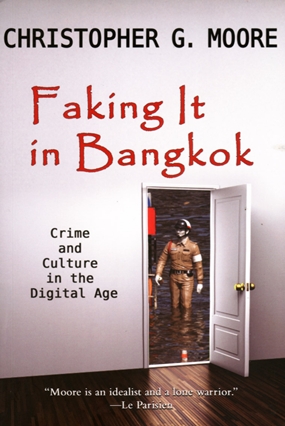Another collection of essays this week from prolific author Christopher G Moore, called Faking It in Bangkok (ISBN 978-616-7503-13-4, Heaven Lake Press, 2012). Moore is probably better known for his Vincent Calvino Private Eye series with 12 books published plus 11 other novels on the shelves such as Waiting for the Lady, and the Wisdom of Beer.
This is his second book of essays, the first being The Cultural Detective, and this one continues on in his incisive way of looking at life as did the first.
The book is divided into six sections, beginning with The Culture of Deception, followed by Crime, Class and Culpability. Part III is Inside-Outside Thai perspectives, with Part IV Violence in the Age of Reason, Part V Information in the Digital Age and finally Part VI being Noir Tales.

Lady Gaga managed to get herself some adverse publicity this month, asking for a fake Rolex (pronounced “Lorex” of course) as Thailand puffed out its metaphorical chest and denied the very existence of such pirated goods. However Christopher Moore speaks with the authority of one who has been there and seen it, writing, “Walk along Sukhumvit Road from Soi 3 to Soi 23 in the heart of Bangkok any night of the week and you will pass vendors hawking pirated DVDs, hookers hawking themselves and nighttime entertainment spots where the pimping and hawking happens inside.” (Like fake watches, prostitution does not exist either.)
Moore is willing to enter debates on many subjects, and the violent heritage of homo sapiens does not escape. He mentions the “brass cow” an instrument of torture, in which people were roasted alive as a public spectacle. “We come from this heritage. Historically, our species killed each other on an epic level. We watched and were entertained by the slow death of others. Next time someone tells you they wish to return to the glorious past, mention the brass cow to them.”
Human trafficking becomes a point in question. He opines that “The Thai government has acknowledged that a problem exists. And, it has done what governments normally do when faced with a difficult problem: set up a commission to study the problem.” Moore is not afraid to bring forth the obvious, which is supposed to remain hidden.
On the cover is a quote from Le Parisien, “Moore is an idealist and a lone warrior.” I am afraid that I do not wholeheartedly agree. An idealist he is, but not a lone warrior. Moore could get an army behind him if he placed a “Positions vacant” advert in the Forces Gazette.
Christopher Moore puts forward very lucid arguments and it was hard not to applaud as a point was made (people tend to look warily at reviewers who become so involved with the story they become voluble)!
At B. 495, this collection of 50 essays is well worth your while investing in. If you have any sense of what is right or wrong in the Thai society, you will not regret the purchase. Moore has laid it all out for you in a very readable and logical format.




